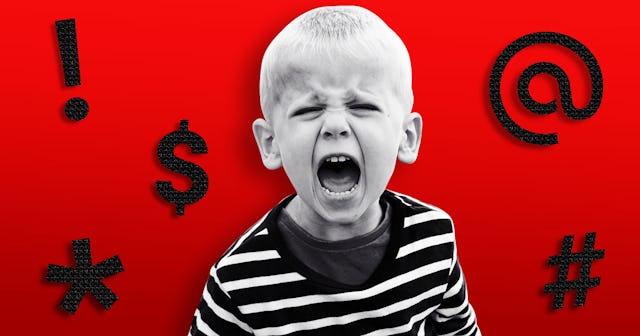Why I Don't Really Care If My Kids Drop An F-Bomb

My kids curse.
My nine-year-old says at least “hell” and “damn” that I’ve heard. He’s used the word “bitch,” but only while singing David’s Bowie’s Oh! You Pretty Things. He’s prone to saying “Oh my God!” in a breathless or annoyed voice. My 11-year-old also curses, but he’s stealthier; I only hear about it from his brothers. My seven-year-old doesn’t curse, that I know of, but I wouldn’t mind if he did.
There are certain words I don’t let them say, and they know not to curse in public. But for the most part, when I hear so-called bad words coming from my babies, I ignore them.
The Curse Words Don’t Mean Anything
For the most part, the “big” curse words — hell, damn, bitch, shit, and f*ck — have been stripped of all meaning. When we say “damn,” we generally aren’t condemning something to hell, we’re using them as an interjection: “Oh, FUCK!” Something’s a “bitch” when it’s hard or difficult. I personally hate the word “shit,” but that’s generally another expletive, and my kids don’t use it, anyway. Even the F-word, the worst word, is most often reserved for the worst situations.
We don’t use them in the context of their actual meanings.
And my kids don’t curse that way, either. If I caught them using the word “shit” to mean poop, I’d call them on it, simply for disgustingness, and if they ever dared to call a woman a “bitch,” someone would be in deep, deep trouble. But the words don’t mean that for them, and if they used the words like that, we’d have a conversation.
Since “ass” isn’t an interjection (we don’t say, “Oh, ass!”), they don’t have a reason to use it, but if they called each other “assholes,” we’d have an issue: I don’t tolerate name-calling of any kind.
So if my 11-year-old says Star Wars: Battlefront: Ultimate Edition “is a bitch,” I won’t turn my head, other than to hide my silent giggle. If he called Princess Leia “a bitch,” he’d be grounded. But he understands the difference, and because he understands that, I don’t mind if he uses the word.
There Are Some Words They Can’t Use
master1305/Getty
There are words I won’t tolerate in my house. If I ever caught my kids throwing out an ethnic slur (there’s no need to name them here; we all know what they are), I’d lose my goddamn mind. There’s a good reason to ban those curse words, too.
When a person uses an ethnic slur, they indicate a hatred and dismissal of an entire group of people. Those aren’t interjections. We don’t yell the n-word as a curse word when we’re angry. Instead, it signals hatred; it signifies an entire odious ideology that has no place in our world, let alone my house.
For the most part, my kids have never heard those words, and wouldn’t use them, anyway. We avoid people who do. Why would we want someone who harbors that kind of hatred in our lives?
There are also two other curse words I don’t let them use, simply because they haven’t been stripped of their meaning: t*ts and c*nt. We all know what they mean, and we still use them to denigrate women and their anatomy. Because they’re still in use as misogynist slurs (and the c-word is ugly anyway), my kids are banned from them. I don’t honestly know if they’ve ever heard them, either.
However, if they were reading Shakespeare, and Hamlet said, “Pardon me my Lord, I thought we spoke of country matters,” I’d explain the pun on “country” and “c*nt”, and I wouldn’t harass them for saying it. No fair for them to miss a damn good joke.
The Words Are Situational
I don’t care if my kids curse. My husband does. So when I hear them curse, I often say something like, “Don’t let your father hear you say that, you know how he feels about you cursing.” So they don’t curse in front of Daddy. Easy-peasy.
They’re also aware that those words are not appropriate for public use. I’d be angry if they shouted, “Oh, hell!” in the toy aisle at Target. My kids understand that curse words are situational, and can only be deployed in certain circumstances: i.e., when they’re alone, or when certain adults aren’t around.
So you would never know my kids curse. They wouldn’t use those words in front of you … or most adults who aren’t me.
Curse Words Are Usually Expletives
Bottom line: every word depends on its context. Most words are used as interjections, or have meanings unrelated to their original definition. However, when those same words are directed at people (“He’s an asshole,” “You’re a goddamn idiot,” “She’s a bitch”) they become deeply offensive.
We don’t call people names in my house. We don’t ridicule them or diminish them. So my kids don’t curse about people, and they don’t curse at each other. But if the f-word slipped out: “That’s a fucking pain,” or “Fuck, this is hard!” — I wouldn’t care. Why bother? It’s only a word.
So as long as they don’t direct curse words at people, or use them to signify actual objects (I don’t want them to say they fell on their ass, for example), they can curse away. I’ll only giggle a little and let it slide.
Every word depends on how it’s used, and my kids understand the difference. If they didn’t, we’d have a conversation about what’s appropriate and what’s not. That’s a life lesson, and it tells them something about the way we treat people.
It’s worth the occasional “Dammit!”
This article was originally published on